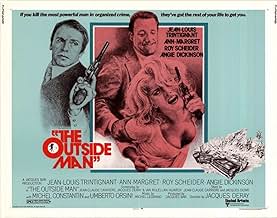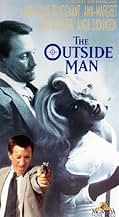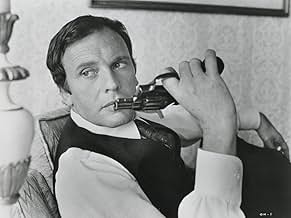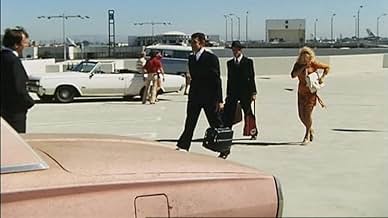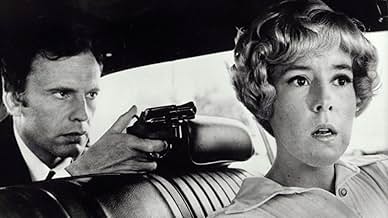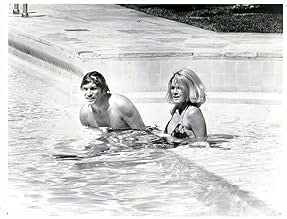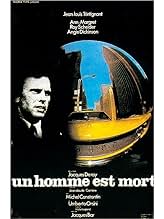CALIFICACIÓN DE IMDb
6.5/10
1.4 k
TU CALIFICACIÓN
Agrega una trama en tu idiomaAfter fulfilling a contract killing in Los Angeles, a French hit man becomes the target of a hit himself and tries to flee back to Paris.After fulfilling a contract killing in Los Angeles, a French hit man becomes the target of a hit himself and tries to flee back to Paris.After fulfilling a contract killing in Los Angeles, a French hit man becomes the target of a hit himself and tries to flee back to Paris.
Ed Greenberg
- Hitchhiker
- (as Edward Greenberg)
Jackie Earle Haley
- Eric
- (as Jackie Haley)
Argumento
¿Sabías que…?
- TriviaAccording to Jackie Earle Haley, when Jean-Louis Trintignant slaps him in the face, Trintignant really slapped him hard. Two takes were filmed and Trintignant slapped for real both times.
- ErroresWhen the young cab driver is killed at home, he first receives the shot and then waits one second to be thrown on the floor, as if he hesitated to do it.
- Versiones alternativasAn "X" Rated addition used for European release contains 10 additional minutes, most notably in the scene where Jean Louis Trintignant meets Ann Margret at the downtown LA nightclub. The European version contains full frontal nudity throughout the scene. This "X" rated version screened in Los Angeles at the American Cinematheque in 1998 and was mistakenly screened as the "PG" version on Showtime Networks in 2001.
- ConexionesFeatured in Dusk to Dawn Drive-In Trash-o-Rama Show Vol. 2 (1996)
Opinión destacada
After reading the comments here I decided to go see this movie when it played at a revival house. Now that I have seen as much of "The Outside Man" as I could stomach, I'm baffled by these other responses.
What some film buffs will accept in the name of nostalgia for a "Lost LA" knows no bounds. If this movie were set in some other place, no one would ever give it his/her time. It is shot like a TV movie (I'm not entirely convinced that it was *not* a TV movie, given the number of TV actors who appear). It is very, very poorly written, acted, and directed. Shoddy, even. The dialogue is stiff, but not even stiff in a clipped, noirish way, or in a way that could provide camp value. The actors are so wooden that they often wait an extra beat and glance off camera before delivering their responses to one another. The editing is absurd.
The film boils down to a series of vignettes involving our alienated French hit-man encountering and negotiating "LA scenes"--the boring housewife, the biker gang, the jesus-freak, the 'tough' blonde hooker, etc. None of these scenes connects with any other in any significant way. They're all just slices of life in 'gritty' LA, but shot in such a fake way that there is nothing whatsoever of 'the real' about them.
Of course, I'm not really qualified to speak about the movie as a whole, because I walked out. I have now walked out of a grand total of 3 movies in my life. I felt so liberated when I left, though, that it almost made watching the first half an hour or 45 minutes worth it.
Perhaps for many people the nostalgia factor overrides these critiques. I understand nostalgia for old LA, too, but for a city that was in fact entirely different than the LA of today (such as the one portrayed in "Mildred Pierce," say). This movie, however, focuses on LA as a hip, modern city, with rivers of freeways and 6-lane boulevards swamped with traffic. How different this is from today's LA is unclear to me. Sure, one can look at this film and say, "Gee, I remember when that club was still open," or "Oh, I loved that old pier." But these feelings run entirely counter to what this film says about LA: that it doesn't care about people's sentimental attachments to particular places and things, so get out of the way or become part of the pavement.
Let's face it, post-1950 or so, LA became a city defined by rapid change, of plowing under the old so the young citizens of today can make their mark. (Of course, pockets of 'old LA' still remain, and always will; not everything can get plowed under as efficiently as late capitalism would like.) This notion of change defines LA. However, some people cling to nostalgia for a particular era, even if it runs counter to what LA was 30 years ago and is today. This is a typical American set of actions and sentiments: destroy what is in order to bring on something new; glorify this destruction and change while it's happening; regret that we have brought about this change once it has been effected; build monuments to that which we have destroyed; lovingly remember that which has passed because it seems to come from a more innocent time; rebuke ourselves for ever thinking that we should have destroyed what was; repeat.
I swear, in a few years people are going to be saying things like, "I really miss that pocked old parking lot that surrounded the Cinerama Dome."
What some film buffs will accept in the name of nostalgia for a "Lost LA" knows no bounds. If this movie were set in some other place, no one would ever give it his/her time. It is shot like a TV movie (I'm not entirely convinced that it was *not* a TV movie, given the number of TV actors who appear). It is very, very poorly written, acted, and directed. Shoddy, even. The dialogue is stiff, but not even stiff in a clipped, noirish way, or in a way that could provide camp value. The actors are so wooden that they often wait an extra beat and glance off camera before delivering their responses to one another. The editing is absurd.
The film boils down to a series of vignettes involving our alienated French hit-man encountering and negotiating "LA scenes"--the boring housewife, the biker gang, the jesus-freak, the 'tough' blonde hooker, etc. None of these scenes connects with any other in any significant way. They're all just slices of life in 'gritty' LA, but shot in such a fake way that there is nothing whatsoever of 'the real' about them.
Of course, I'm not really qualified to speak about the movie as a whole, because I walked out. I have now walked out of a grand total of 3 movies in my life. I felt so liberated when I left, though, that it almost made watching the first half an hour or 45 minutes worth it.
Perhaps for many people the nostalgia factor overrides these critiques. I understand nostalgia for old LA, too, but for a city that was in fact entirely different than the LA of today (such as the one portrayed in "Mildred Pierce," say). This movie, however, focuses on LA as a hip, modern city, with rivers of freeways and 6-lane boulevards swamped with traffic. How different this is from today's LA is unclear to me. Sure, one can look at this film and say, "Gee, I remember when that club was still open," or "Oh, I loved that old pier." But these feelings run entirely counter to what this film says about LA: that it doesn't care about people's sentimental attachments to particular places and things, so get out of the way or become part of the pavement.
Let's face it, post-1950 or so, LA became a city defined by rapid change, of plowing under the old so the young citizens of today can make their mark. (Of course, pockets of 'old LA' still remain, and always will; not everything can get plowed under as efficiently as late capitalism would like.) This notion of change defines LA. However, some people cling to nostalgia for a particular era, even if it runs counter to what LA was 30 years ago and is today. This is a typical American set of actions and sentiments: destroy what is in order to bring on something new; glorify this destruction and change while it's happening; regret that we have brought about this change once it has been effected; build monuments to that which we have destroyed; lovingly remember that which has passed because it seems to come from a more innocent time; rebuke ourselves for ever thinking that we should have destroyed what was; repeat.
I swear, in a few years people are going to be saying things like, "I really miss that pocked old parking lot that surrounded the Cinerama Dome."
- omit0
- 22 may 2004
- Enlace permanente
Selecciones populares
Inicia sesión para calificar y agrega a la lista de videos para obtener recomendaciones personalizadas
- How long is The Outside Man?Con tecnología de Alexa
Detalles
- Fecha de lanzamiento
- Países de origen
- Idiomas
- También se conoce como
- The Outside Man
- Locaciones de filmación
- Beverly Hilton Hotel - 9876 Wilshire Blvd., Beverly Hills, California, Estados Unidos(Lucien arrives at his hotel.)
- Productoras
- Ver más créditos de la compañía en IMDbPro
- Tiempo de ejecución1 hora 44 minutos
- Color
- Relación de aspecto
- 1.85 : 1
Contribuir a esta página
Sugiere una edición o agrega el contenido que falta

Principales brechas de datos
By what name was Un homme est mort (1972) officially released in India in English?
Responda
